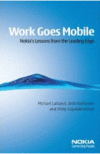
It has sort of become a tradition for me to bring back a book on wireless from the 3GSMWorldCongress. This year, I’ve picked a somewhat unusual book for me as it is not about a particular technology but about how technology can enable work to go mobile. The book is called “Work Goes Mobile” and the three authors discuss the ongoing process at Nokia to mobilize their workforce. This blog entry is not intended as a full book review but rather for me to write done some thoughts about topics in the book that were of particular interest to me. Having said that I can recommend the book very much and further information about it can be found here.
Topics and statements in the book I found useful and some comments from my side:
Mobility is more than a technology: Mobilizing a business means to embed mobility into the fabric of a business.
Mobilizing a business has three dimensions which need to be addressed: People, process and technology.
Zero latency: The aim of mobilizing a business is to come as close to a ‘zero latency’ process as possible. In other words, a process is optimized to contain as few disruptions as possible due to inefficient communication. E.g. writing down a failure report on a piece of paper that is manually put into a CRM system a couple of days later.
Good and bad sides of mobility: The book discusses pros and cons of mobility and addresses prejudices and perceptions of workers on introducing new processes generally and mobility specifically.
Freedom of choice: One statement I particularly liked: “Mobility is about freedom of choice – it’s not a forced directive to work 24/7 but an individual decision to work when and where it is most appropriate”. Sometimes this is easier said and done and involves a learning process for both the mobile worker and the management that needs to understand how to manage mobile workers. Both mobile work and managing mobile workers are fundamentally different from working on a desk and managing desk bound workers.
The book is technology neutral: Even though written by Nokia employees and copyrighted by Nokia the book does not try to push any kind of Nokia devices or services. I like this approach very much as I find books, brochures, or articles written companies which only aim at pushing their products rather tiring.
Mobility is not an end state but an evolving process.
Workload management: Mobility is not intended to increase workloads. It helps workers to be as efficient as possible in the time they dedicate to their work. In general this is true but requires a management that understands this one the one hand and a good amount of self control to balance private and work time.
Challenges to Mobility: There are plenty and I like the discussion of how to overcome/deal/change/improve reluctance to change, management competency to deal with a mobile workforce, mobile workplace challenges, operation support, self management, family, processes.
Benefits: Mobility brings quantitive and qualitative benefits and one should be aware of both. A quantitive benefit can be measured in monetary terms, e.g. reduced time to spend on paperwork increases the number of cases a mobile field worker can deal with a day. Qualitative benefits are things one can not measure in such a way. Examples are increased employee satisfaction because of increased flexibility, freedom, etc., or increased customer satisfaction due to faster response times and quicker problem solutions.
This book is quite an eye opener for me as I mainly deal with the technical domain on a day to day basis. The book shows, however, that this is just one of many dimensions that need to be addressed to mobilize businesses in particular and people general.
P.S.: Daniel, this book could potentially be very interesting for you, too!
Hi Martin,
Interesting post will see if I can get a copy of the book and read it.
On a similar subject did you see a recent report from O2 to that said “Mobiles save workers 20 Minutes a day”? (here is the link to the press release http://www.o2.com/media/press_releases/latest_pr_1350.asp ).
Still trying to digest the economics on which the report is based, but the as a PhD grad in Economics this can sometimes take longer than normal folks!